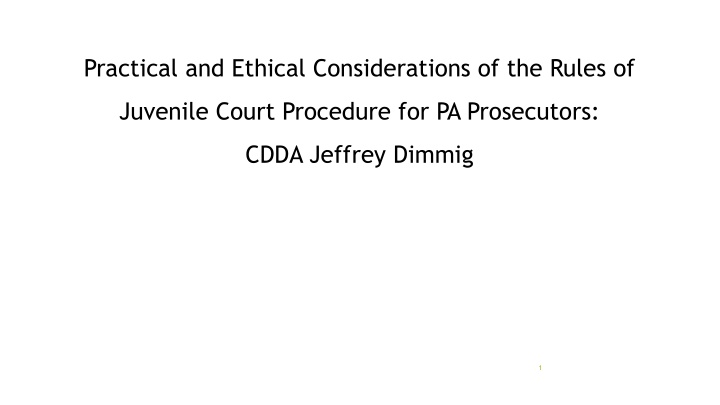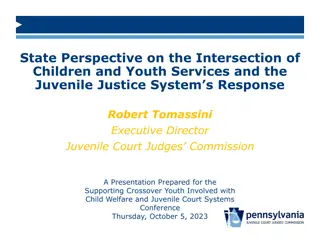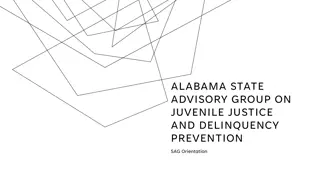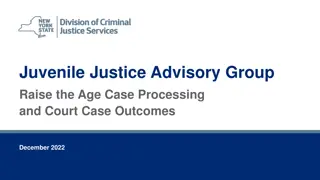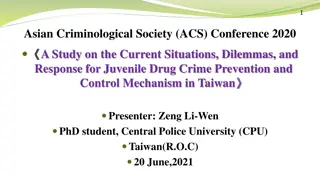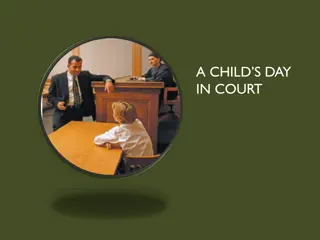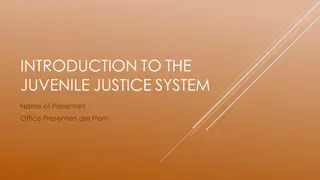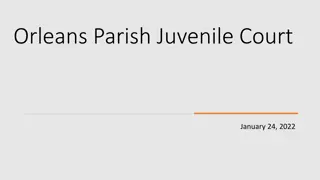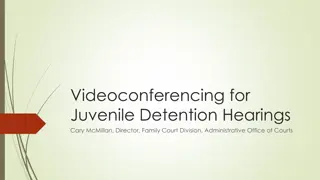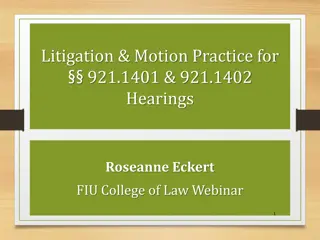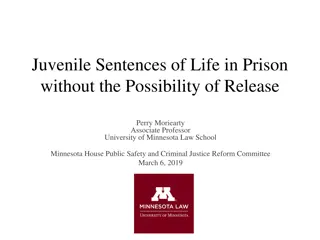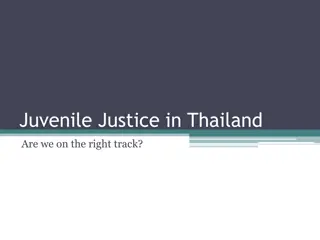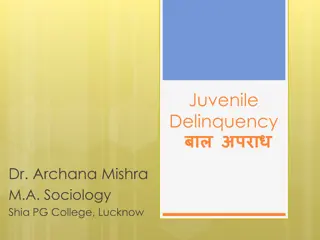Practical and Ethical Considerations in PA Juvenile Court Procedures
Exploring the Pennsylvania Juvenile Act, Rules of Juvenile Court Procedure, Victims Bill of Rights, and Juvenile Prosecution Standards, focusing on the balanced approach to protection, accountability, competency development, and justice for victims and juveniles in delinquency cases.
Download Presentation

Please find below an Image/Link to download the presentation.
The content on the website is provided AS IS for your information and personal use only. It may not be sold, licensed, or shared on other websites without obtaining consent from the author.If you encounter any issues during the download, it is possible that the publisher has removed the file from their server.
You are allowed to download the files provided on this website for personal or commercial use, subject to the condition that they are used lawfully. All files are the property of their respective owners.
The content on the website is provided AS IS for your information and personal use only. It may not be sold, licensed, or shared on other websites without obtaining consent from the author.
E N D
Presentation Transcript
Practical and Ethical Considerations of the Rules of Juvenile Court Procedure for PA Prosecutors: CDDA Jeffrey Dimmig 1
The Pennsylvania Juvenile Act Juvenile Act of Pennsylvania, 42 Pa.C.S.A. 6301 et. seq. Amended in 1996 to incorporate the balanced attention to the protection of the community, the imposition of accountability for offenses committed and the development of competencies to enable children to become responsible and productive members of the community. 42 Pa.C.S. 6301(b)(2). 2
Jurisdiction the Bubble >14 + PREV ADJ CERTAIN VIOLENT FELONIES ATT/CONSP/SOLIC DELINQUENT ACTS SUMMARY OFFENSES CHILD 10<18 <21 SUPERVISION MURDER >14 + DW CERTAIN VIOLENT FELONIES ATT/CONSP/SOLIC PRIOR CRIMINAL CONVICTION 3
The Pennsylvania Rules of Juvenile Court Procedure Designed to be utilized in conjunction with the Juvenile Act of Pennsylvania Adopted in April 2005 and effective October 1, 2005 Divided into two categories: delinquency matters (Rules 100 1099) and dependency matters (Rules 1100 2099) Abbreviated as Pa.R.J.C.P. 237 Pa. Code 100 et. seq. 4
The Victims Bill of Rights Victims Bill of Rights within the Crime Victims Act 18 P.S. 11.201 et seq. Applied to juvenile court cases in 2000 5
Juvenile Prosecution Standards Adopted by the PDAA in 2010. Designed to ensure that prosecutors realize their ultimate goal: to do justice in every delinquency case throughout the Commonwealth of Pennsylvania. Provide guidance to juvenile court prosecutors Some of the standards correspond to certain Rules of Juvenile Court Procedure 6
Juvenile Prosecution Standards A prosecutor should work to assure that victims and juveniles receive a fair hearing and that their constitutional and other legal rights are recognized and enforced pursuant to 42 Pa.C.S. 6301(b)(4). Further, the Crime Victims Act, 18 P.S. 11.102(2), mandates that The rights extended to victims of crime . . . are to be honored and protected by law enforcement agencies, prosecutors and judges in a manner no less vigorous than the protections afforded criminal defendants. 7
General Responsibilities of Juvenile Court Prosecutors A juvenile court prosecutor should strive to seek justice as their primary duty. While devoting foremost attention to the interests and safety of the community and victim, prosecutors should consider the needs of the juvenile to the extent that it does not compromise the duty to faithfully represent the Commonwealth. 8
Juvenile Court Prosecutors Should Represent the Interests of the Commonwealth at Every Stage of the Proceedings By appearing at all stages of the proceedings, the prosecutor insures that the juvenile court maintains a focus on the safety of the community and the interests of the victim at each decision-making level. 9
Updates to the Rules of Juvenile Court Procedure Rule 515 Dispositional Order - effective April 1, 2023 In response to Com. v. Koger, the courts can no longer rely on Juvenile Probation (JPO) to provide the conditions, even standard conditions, to juveniles after a proceeding The court must impose the conditions of probation at the time of the disposition Mandates that all conditions of probation, if not enumerated in the dispositional order, shall be attached to the order 10
Updates to the Rules of Juvenile Court Procedure Proposed Rule 405 Forensic Laboratory Report in Lieu of Expert Testimony JPN requested this new rule to mirror Criminal Rules, R. 574 Rules Committed published a proposed rule for comments, due on January 17, 2023 No decision yet by Supreme Court or its Juvenile Rules Committee 11
Juvenile Justice Reform Act of 2018 (JJRA): The Interest of Justice Hearing Process for Certified (Transferred) Juveniles & Direct File Juveniles (DFJs) 12
Certified & DFJs To Be Housed at Juvenile Facilities JJRA of 2018, 34 U.S.C. 11133(a)(11) Effective as of Dec. 21, 2021 It is retroactive: applies all minor defendants as of effective date It applies to minor defendants (those under age 18): completed transfer from juvenile to criminal court (Juv. Act 6355), and Direct File Juvenile (DJF) arrests If minor defendant is 18 upon certification (transfer) or arrest as DJF, standard adult procedures are followed; defendant is housed at the jail if he/she cannot post bail 13
JJRA Overview: If under age 18, Def must be housed at a juvenile facility if minor defendant cannot make bail, UNLESS: court finds that the interest of justice requires that the minor defendant be held in adult facility minor defendant is ordered to the jail/adult facility If court finds the interest of justice doesn t require housing in an adult facility, he/she is housed at a juvenile facility What if circumstance change, can you refile the motion? Defendant can still make bail regardless of location 14
When or Where Is The IOJ Hearing Held? Transfer case - at the conclusion of a transfer hearing if minor defendant cannot make bail For Direct File Juvenile (DFJ) it is not specified in the JJRA when the hearing must take place, varies with county We may get some guidance with new: Statewide legislation, and/or Rules of Criminal Procedure Maybe Rules of Juvenile Court Procedure 15
What Does The IOJ Process Look Like? When is the request for IOJ hearing made District Court? Common pleas court? What is the time frame that the initial IOJ must be held? What motions/orders/forms are you using? Who handles, juvenile or criminal prosecutor? What is the burden of proof? 16
Interest of Justice (IOJ) Hearing: Factors to be considered by the court: Age Physical and mental maturity Present mental state, any imminent risk of self-harm Nature & circumstances of the alleged offense History of prior delinquent acts Relative ability of the available adult and juvenile facility to both meet the needs of the individual but to protect the public and other youth in their custody Any relevant factor 17
Needed Testimony Regarding: Current offense Prior offenses Juvenile s history (JPO/CYF/MH/placements/treatments/violence), including any evaluations that goes to mental maturity or sophistication Juvenile s needs Ability of juvenile facility to provide staffing, to protect the juvenile as well as other juveniles in the facility Ability of the adult facility to separate minor defendants from adults and to maintain staffing to enable a safe environment Availability of there a youth facility/bedspace available especially if the county doesn't have its own detention center 18
Witnesses Needed: Affiant current offense/age/physical maturity prior offenses/history/placements/treatments history in community violence)/needs ability to supervise/protect others/provide services for minor defendant Juvenile probation Probation/Police Supervisor (juv. facility) Supervisor (adult facility) to separate sight and sound from adults/maintain adequate staffing/safety JPO/Supervisor (juv. facility) Lack of available juvenile facility beds Etc. 19
Court Finds Interest of Justice Burden Is Met: If court finds that the IOJ requires housing in an adult facility, the minor defendant : must have a review of the IOJ determination every 30 days (45d in rural county) cannot be held in adult facility for more than 180 days total unless court finds good cause for extension or defendant waives Prison Rape Elimination Act s (PREA) Youthful Inmates Provision still applies 20
30-day IOJ Review Hearings Is the same judge handling the review? Do you need to restate everything from prior hearing? Are all witnesses recalled for the review hearing? Is the review pro-forma or substantial? Need to balance exhaustive review with pro forma review Ask court to take Judicial Notice of previous hearings Pa.R.E. 201 Provide certified copies of documents and transcripts when possible 21
JJRA No Longer Applies When: Once a minor defendant turns 18 years old, the JJRA no longer applies and he/she must be moved from the juvenile facility to the local prison/adult facility what is the process to move to an adult facility? Is a hearing required? Is a court order required to transfer the defendant 22
There may be clarification, maybe: DISCLAIMER: THIS IS A PROPOSED RULE, IT MAY NEVER BE ADOPTED OR MAY UNDERGO SUBSTANTIAL CHANGE BEFORE ADOPTION The Criminal Procedural Rules Committee proposed a new rule to address the ambiguity of the JJRA Refers to Certified & DFJs as Minor Defendants who are to be housed in a juvenile facility with the Interest of Justice Exception Upon deciding bail, issuing authority can make primary determination once a party requests housing at adult facility, but must consider factors (above) Common pleas judge to hold a de novo review hearing within 5 days OR A party may file a motion in court of common pleas at any time requesting minor defendant be detained at an adult facility with a hearing held within 72 hours of the filing of the motion In either case, CCP must consider each factor and state findings on each factor in the order If exception is found, review housing at adult facility every 30 days with a maximum of 180 days (unless waived or good cause extension) 23
JJRA Issues: Lack of secure bed space across PA will intensify with these minor defendants being housed in juvenile facilities See Pennsylvania Secure Detention Analysis: Impact of Facility Closures on Accessibility of Services by JCJC in December 2021 What about housing females? Resources being devoted to full hearings at every 30-day review when it may not be necessary If situations change or more information becomes available, can we file a new motion for an IOJ hearing be filed? 24
Discussion: What issues are you seeing? 25
Reminder: Victims of Sexual or Physical Abuse The name of a minor victim of sexual or physical abuse is not to be disclosed by the court to the public; any records shall not be open to public inspection Violation is a misdemeanor 3 offense, Title 42 Pa.C.S. 5988 Victims Or Witnesses With Autism Or Intellectual Disability An out of court statement made by a victim or witness with autism or an intellectual disability describing certain offenses can be admissible in any criminal or civil proceeding. Certain requirements apply. Title 42 Pa.C.S. 5993, effective August 27, 2019
Reminder: 1318.1 of the Public School Code of 1949 (Act 110 of 2020 ) Mandates public schools to expel, transfer, or reassign a student convicted of or adjudicated on Rape, Stat. Sex. Assault, Sex. Assault, IDSI, Agg. Ind. Assault, or Indecent Assault if the victim is enrolled in the same public school entity. Unclear as to who provides notice of the adjudication; JPO cannot inform the school under penalty of 42 Pa.C.S. 5988 When registering a student for school, the juvenile s parent/guardian must sign provide a sworn statement or affirmation that the juvenile was previously or currently expelled based on the provisions of the Act A student CONVICTED (not the same as a student adjudicated) of a sexual offense who is enrolled at the same public school entity as the victim must inform the school within 72 hours of the conviction Title 24 P.S. 1318.1, effective January 4, 2021
Reminder: - effective April 1, 2022 Rules 515, 610, 612, & 632 Restitution is now part of financial obligations (fees, finds, costs); Court must consider mandates of 6352 that restitution is reasonable and appropriate for the rehabilitation plan considering nature of offense and earning capacity of the juvenile; Clarifies that restitution can be adjusted upward & downward after the final disposition but advises against upward adjustment. To request reduction, prior to any hearing, the victim must be notified specifically of the intent to reduce restitution; Rule 632 Comment clarifies compelling reason for early termination can be singular & that court has broad discretion in weighting each goal of the Juvenile Act specific to the individual juvenile in making such decisions 28
